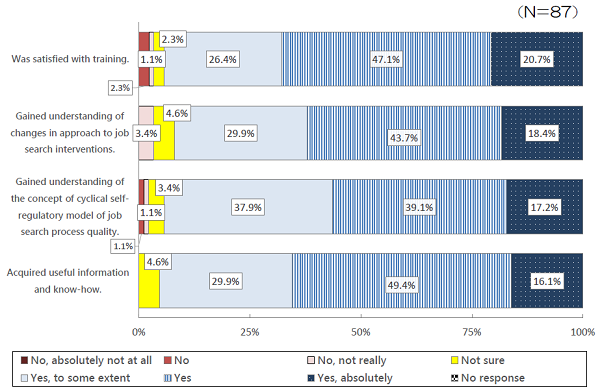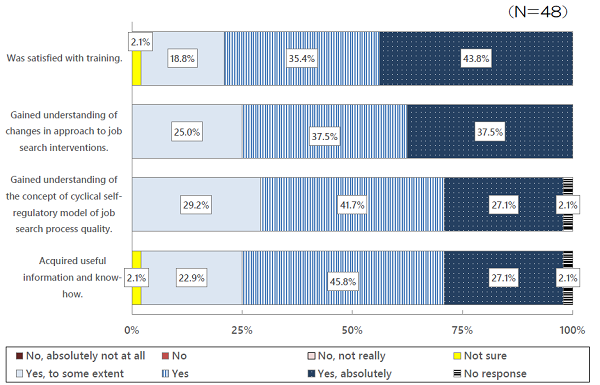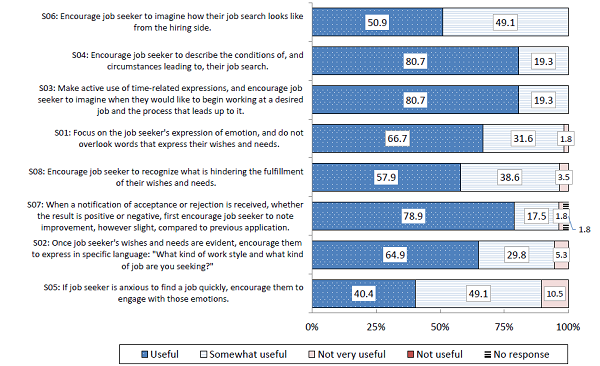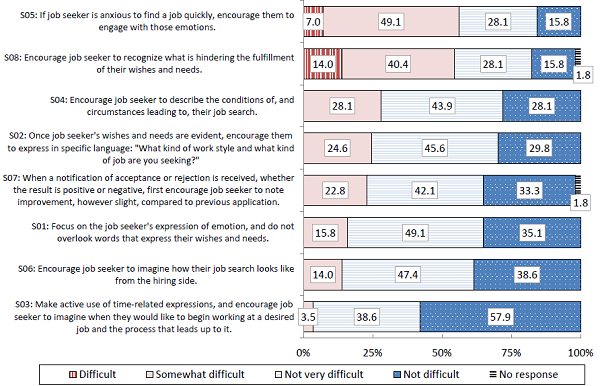JILPT Research Report No.203
Research on Job Search Interventions:
Examination of the Feasibility of a Cyclical Self-Regulatory Model of Job Search Process Quality
January 16, 2020
Summary
Research Objective
The objective of this research is to clarify the importance of self-regulation in job searches from a psychological perspective, and to develop training programs to promote this self-regulation.
In conducting this research, reference was made to research on job search interventions, which is being actively conducted in Western countries (notably the United States and the Netherlands). Job search interventions are a type of training program designed to “help job seekers look for employment or secure employment faster” (Liu et al. 2014: p.1010).
As an approach to developing training programs that promote self-regulatory job search, we focused on the cyclical self-regulatory model of job search process quality (Van Hooft et al. 2013). This is a prescriptive model that specifies desirable job search criteria. It is envisioned that using this prescriptive model will enable job seekers to understand what aspects of their job search behaviors to alter and how, and give staff a better understanding of how to help job seekers to look for employment or secure employment faster.
Research Method
When examining the feasibility of the cyclical self-regulatory model of job search process quality at “Hello Work” (public employment security offices), a method similar to action research (hereinafter referred to as “action research-based method”) was adopted under the framework of training research. Training research refers to the JILPT project in which researchers incorporate their findings on training research into future training programs aimed for labor administration personnel held at the Labour College of the Japan Institute for Labour Policy and Training in order to improve the content of the training programs, and in turn, the results are to be further utilized in their subsequent research (JILPT 2017).
Kurt Lewin, who pioneered the concept of action research, stated in his paper (1946) that “we should consider action, research and training as a triangle that should be kept together for the sake of any of its corners” (p.42). Believing that training is necessary when putting a theory into practice, he suggested a triune action research to be carried out; research, training and practice.
The action research-based method used for this report followed this procedure:
1. Research
Empirical job search intervention research, based on the protocol of experimental design, is thought of as having begun in the late 1970s, but it was preceded by job search research, and the roots of this research go back to unemployment research during the Great Depression circa 1930. We surveyed these researches and examined psychological perspectives on support for the unemployed and job seekers.
Based on this history, we looked at the characteristics of research on job search interventions, and examined typical job search intervention programs and the general image of the “job seeker” that underlies this research. Since the 2000s, self-regulation theory has been a common framework for integration of research on job searches and job search interventions (Kanfer et al. 2001). We considered the significance of studying job search interventions from the standpoint of self-regulation theory, and studied its relevance to other theories related to job search interventions. Then, we considered the psychological mechanisms that create self-regulation in job searches, and examined the cyclical self-regulatory model of job search process quality that forms the framework of this research.
2. Training
Based on the above 1, a training program was formulated to introduce a cyclical self-regulatory model of job search process quality, and this program was conducted during the Evening Session workshops (voluntary extracurricular training for Hello Work staff held at the Labour College). In addition, we created career counseling TIPs (JILPT 2009) that summarize “small techniques for choosing expressions and little devices for phrasing words” to promote job seekers’ self-regulation in vocational guidance and referral services, and incorporated them into the training programs of the staff training courses at the Labour College.
3. Action
In terms of the original “action research” model, here “action” refers to staff who participated in the training program created in the above 2 implementing the training program using the cyclical self-regulatory model of job search process quality, and carrying out the TIPs in their career counseling duties. After a certain time, a questionnaire was administered to track the subsequent employment status of job seekers and verify the effectiveness of the model. This time, an action research-based method was employed, in which a questionnaire was administered to staff who participated in the training program created in the above 2, and the effectiveness of the training program and the career counseling TIPs was assessed. The feasibility of a cyclical self-regulatory model of job search process quality at Hello Work offices was examined based on the results of these assessments.
Main Findings
To examine the feasibility of the cyclical self-regulatory model of job search process quality at Hello Work offices, the Evening Session workshops held at the Labour College were utilized to conduct two types of training programs that outline the approach and know-how of the model, “Employment Support for Welfare Recipients” and “Frontiers in Job Search Intervention Research,” and questionnaires were administered to determine whether the model is effective in promoting career counseling work by participants, i.e. staff at Hello Work offices. With regard to both training programs, most participants responded that they understood the concept of cyclical self-regulatory model of job search process quality, and obtained from it information and know-how that were useful for their career counseling duties (See Figure 1 and 2).
Figure 1. Assessment of Evening Session workshop “Employment Support for Welfare Recipients”

Click to enlarge
Figure 2. Assessment of Evening Session workshop “Frontiers in Job Search Intervention Research”

Click to enlarge
To examine the feasibility of the cyclical self-regulatory model of job search process quality, career counseling TIPs were created so as to apply the desirable job search criteria specified by that model to know-how used for career counseling duties, and participants were asked to assess the TIPs. The findings were that almost all TIPs were assessed as being useful on the job (see Figure 3).
Regarding on-the-job utilization, a majority of participants responded that it was not difficult to utilize six out of the eight TIPs in their duties, while the other two TIPs were evaluated by a majority of participants as raising job seekers’ awareness of their own impatience or anxiety and the problems they were facing, and being difficult to apply effectively on the job (see Figure 4).
Figure 3. Usefulness of career counseling TIPs on the job (unit: %, N=57)

Click to enlarge
Figure 4. Difficulty of utilizing career counseling TIPs (unit: %, N=57)

Click to enlarge
These findings indicate that most participants take a positive view of the feasibility of the cyclical self-regulatory model of job search process quality on the job.
Policy Implications
From the findings of this research, we were able to gain a picture of the on-the-job feasibility of the cyclical self-regulatory model of job search process quality. A key future task is to develop a job search intervention program based on this cyclical self-regulatory model of job search process quality for job seekers. For this reason, it is important that we take advantage of the opportunities presented by the Evening Session workshops, ask participants (Hello Work staff) for their cooperation, give them opportunities to evaluate the program from the standpoint of job seekers, and based on the results, refine and improve the training program.
After that, it is necessary to implement the program on a trial basis in an orientation meeting at Hello Work offices and at job search intervention seminars and so forth, collect evaluations from job seekers using questionnaires and other means, and revise and update the program on an ongoing basis. If the results of questionnaires are positive, we will develop a manual for the program and promote its dissemination, with the goal of widespread implementation at Hello Work offices.
Policy Contribution
Introducing research on job search interventions to Japan is expected to have the following two effects. The first is to vitalize and accelerate research in this area, through understanding of methodologies related to research development in training programs. The second is that introducing the theory of job search interventions, which has received little attention thus far in Japan, will systematically organize the on-the-job experiences of Hello Work office personnel, and enable efficient accumulation of on-the-job know-how in the form of action-oriented expertise.
Contents (available only in Japanese)
- JILPT Research Report No.203 Whole Text (PDF: 6.6MB)
- Appendix: Handout Materials No.1-8 (PDF: 5.3MB)
If it takes too long to download the whole text, please access each file separately.
- Cover – Preface – Authors – Contents (PDF: 618KB)
- Chapter 1: Introduction (PDF:1.5MB)
- Chapter 2: Unemployment research history and self-regulatory job search (PDF: 1.4MB)
- Chapter 3: Trends in job search intervention research (PDF: 1.6MB)
- Chapter 4: Significance of job search intervention research from the perspective of self-regulation (PDF: 1.3MB)
- Chapter 5: A prescriptive model for job searches based on self-regulation theory (PDF: 1.7MB)
- Chapter 6: Examination of the effectiveness of a cyclical self-regulatory model of job search process quality at Hello Work offices (PDF: 1.3MB)
- Chapter 7: Examination of the feasibility of a cyclical self-regulatory model of job search process quality at Hello Work offices (PDF: 1.5MB)
- Chapter 8: Discussion and policy implications (PDF: 1.1MB)
- Appendix: Handout Materials No.1-8 (PDF: 5.3MB)
Research Categories
Project Research: Research on Career Formation Support toward the Achievement of a “Society in which All Citizens are Actively Engaged”
Subtheme: Research on career counseling techniques and job search interventions
Research Period
April 2016-March 2019
Authors
- MATSUBARA Ayako
- Research Director, Japan Institute for Labour Policy and Training
- KAYANO Jun
- Assistant Research Director, Japan Institute for Labour Policy and Training
- YAMAGUCHI Ayaka
- Manager, Risk Advisory, Healthcare, Deloitte Touche Tohmatsu LLC
Catergory
Human resources management / Vocational skills development, Employment / Unemployment
Related Research Results
- Training Implementation Manual Ver.1.0: “Here Are Key Points! Mindset of Job Search: In Pursuit of Desired Jobs” (2019)
- JILPT Research Report No.198: Research and Development of Training Program Utilizing Transcript Analysis of Vocational Counseling and Referral Services: Solution-Focused Approach (2017)
- Discussion Paper 16-05: Research and Development based on “Study on Employment Support for Welfare Recipients: Observations from Research on Support for Job Seekers based on Self-Regulation Theory” (2016)
- JILPT Research Report No.107: Action Research in Career Counseling, Project Study “Research and Development for Enhancement of the Supply-Demand Adjustment Function and the Career Support Function in the Labor Market” (PDF:170KB) (2009)
- JILPT Research Report No.91: Research on Techniques for Career Counseling (PDF:145KB)(2007)
JILPT Research Report at a Glance
| To view PDF files, you will need Adobe Acrobat Reader Software installed on your computer.The Adobe Acrobat Reader can be downloaded from this banner. |

